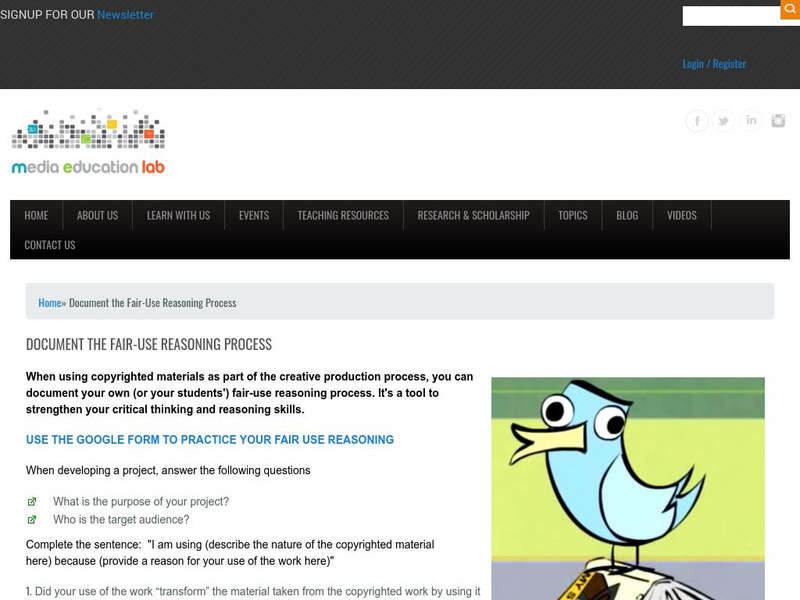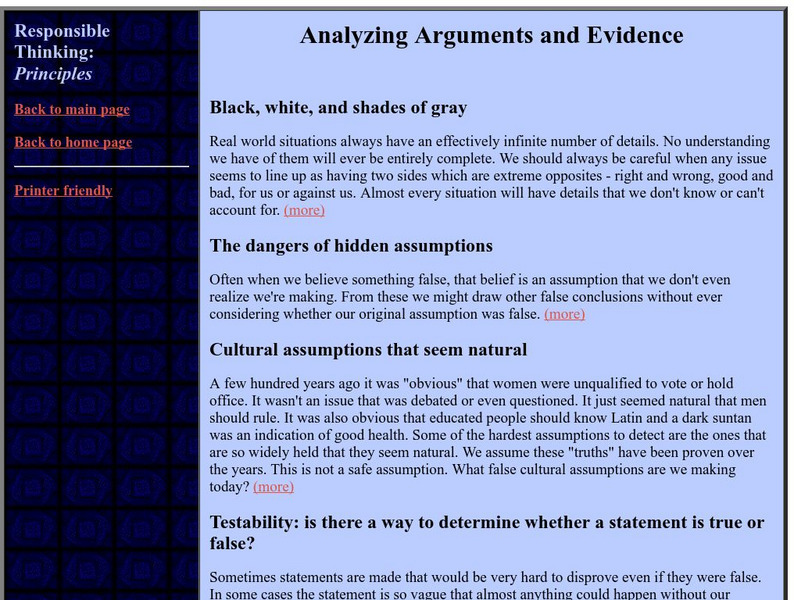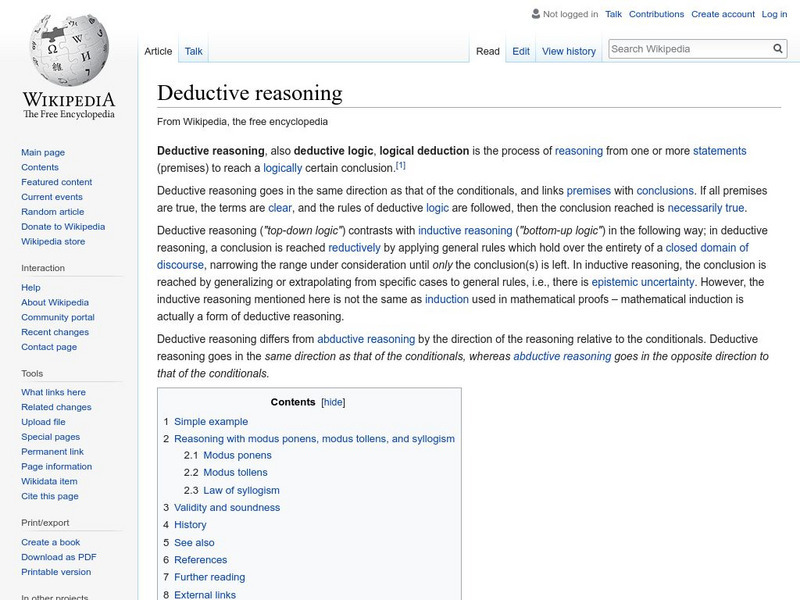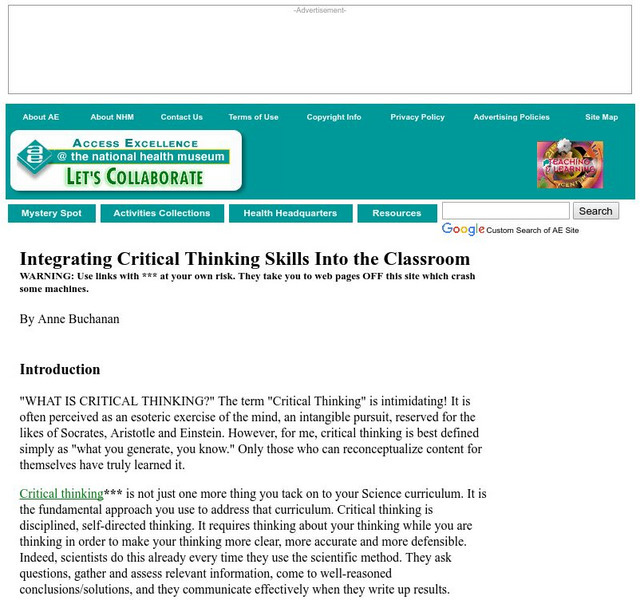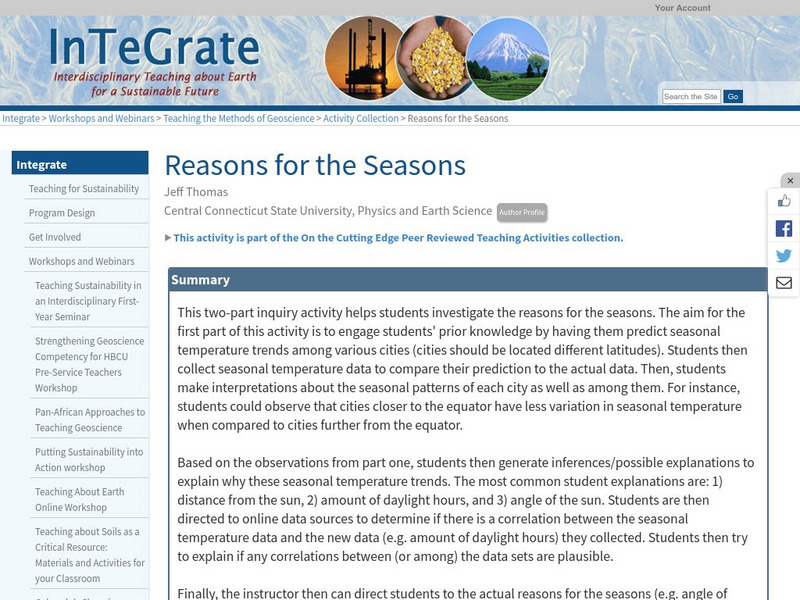College Board
AP® Psychology: Teaching Statistics and Research Methodology
Psychologists use statistics? Scholars investigate the research behind the methodology of statistical analysis. Using hands-on practice, case-studies, and scatterplots, they complete various tasks to understand the very roots of high...
CK-12 Foundation
Ck 12: Scientific Thinking: Scientific Reasoning Advanced
[Free Registration/Login may be required to access all resource tools.] Find out about how people use scientific reasoning to think scientifically. Included in the assignment is a four minute video and review questions.
Texas Education Agency
Texas Gateway: Distinguishing Between Inductive and Deductive Reasoning
This lesson focuses on distinguishing between inductive and deductive reasoning. Sometimes it's difficult to separate these two types of reasoning because we often use them together; drawing conclusions in inductive reasoning is likely...
Other
Criticalthinking.org: Develop Critical Thinking Skills
This site provides a wealth of material tailored to the needs of primary and secondary educators interested in developing their own critical thinking skills and those of their students. Content includes numerous articles focused on the...
Other
Brandeis University: How Planning and Reflection Develop Young Children's Thinking Skills
Young children ages three to six are capable of making thoughtful decisions about their behavior and keen observations about their environment. We can promote the development of thinking and reasoning in young children in the early years...
Other
Harvard University: Project Zero: Artful Thinking
Find engaging ways to integrate visual art and music into regular classroom instruction and strengthen cognitive thinking skills and abilities to reason creatively from multiple perspectives. Get great classroom questioning tips, case...
Maths Challenge
Maths challenge.net: Right Angle Reasoning
A geometry problem for students to use their mathematical reasoning skills to explain a right triangle property.
Other
P21: Critical Thinking and Problem Solving
Learn about the concepts of effective reasoning and critical thinking skills as taught to students.
PBS
Pbs Mathline: Bead Dazzling (Proportional Reasoning) [Pdf]
A comprehensive instructional activity on algebraic thinking where students create and identify patterns using proportional reasoning. Research based, this instructional activity includes technology connections, items for discussion, and...
Other
U. Of Rhode Island: Media Education Lab: Document the Fair Use Reasoning Process
When using copyrighted materials as part of the creative production process, you can document your own (or your students') fair-use reasoning process using this Google form. It's a tool to strengthen your critical thinking and reasoning...
Other
Foundation for Critical Thinking: Elements of Reasoning, Intellectual Standards
Evaluate the eight elements of reasoning and consider what intellectual standards are necessary in order to apply the elements in the process of thinking.
Other
Csicop: Field Guide to Critical Thinking
This article, originally published in Skeptical Inquirer, outlines some of the key components of the scientific problem-solving process while addressing the many reasons for the popularity of paranormal beliefs in the U.S. (Published in...
Science Struck
Science Struck: Examples of Deductive Reasoning
Learn what deductive reasoning is and look at examples of how to apply it.
Other
College of the Holy Cross: The Logic of Scientific Reasoning [Pdf]
Explore the idea of the logic of scientific reasoning with this discussion of how science, thinking, and reasoning relate to one another.
Other
Lee College: Elements of Reasoning [Pdf]
A slide presentation providing definitions and details on the three dimensions of thinking and eight elements of reasoning. Views will also find activities and questions to gain deeper understanding of the psychology of thinking.
Other
Responsible Thinking: Analyzing Arguments and Evidence
Contains many points to consider when analyzing someone's arguments and evidence, such as the hidden assumptions, cultural assumptions, and testability. Each is explained in a short paragraph with a link to additional discussions on...
Texas A&M University
Wtamu Virtual Math Lab: Beginning Algebra: Reasoning Skills
A tutorial on reasoning skills focusing on both inductive and deductive reasoning. Has several examples and exercises with answers and discussion.
Biology 4 kids
Biology4 Kids: Logical Reasoning
Learn how logic and reasoning play a part in everyday thinking, and how deductive and inductive reasoning leads investigators to conclusions.
PBS
Pbs Learning Media: Think Math
Think Math offers a collection of 43 KET-produced resources from Math at the Core: Middle School, including 17 Scale City videos and interactives about proportional reasoning, 14 Wild Fractions animations and games that feature visual...
Wikimedia
Wikipedia: Deductive Reasoning
This free encyclopedia site from Wikipedia gives a definition and examples of deductive reasoning. It also has links to related terms and topics.
National Health Museum
Access Excellence: Integrating Critical Thinking Skills
This site from Access Excellence explores how, as an educator, you can incorporate critical thinking skills into the classroom. Content focuses on how to cover content so that students can grasp information, engage with the teacher, read...
ReadWriteThink
Read Write Think: Book Sorting: Using Observation and Comprehension
Critical thinking, comprehension and analysis skills are the focus of this physical activity. Good beginning to teaching different ways of looking at things.
Stanford University
Stanford U.: Evaluating Information: The Cornerstone of Civic Online Reasoning
This report from the Stanford History Education Group describes the conclusions of their work in field testing a set of assessments of civic online reasoning by young people from the middle school to the college level. Middle school...
Science Education Resource Center at Carleton College
Serc: Reasons for the Seasons
A well-designed science investigation that has students examine and graph seasonal temperature data from cities at different latitudes. They describe trends they see, and explain what they think causes these trends. They then identify...

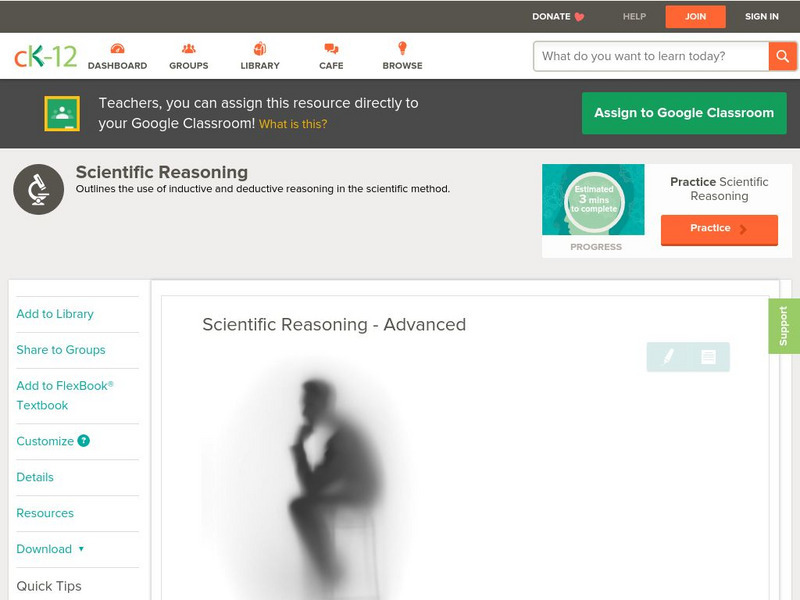

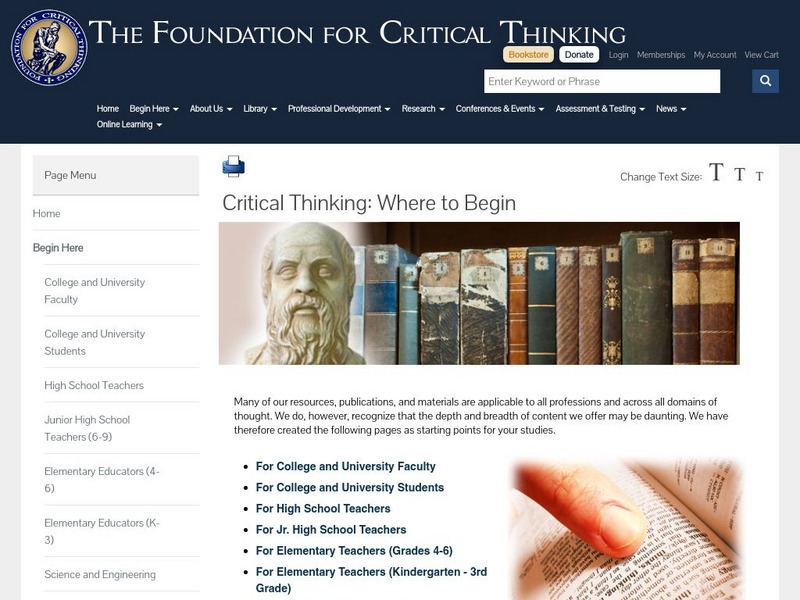




![Pbs Mathline: Bead Dazzling (Proportional Reasoning) [Pdf] Lesson Plan Pbs Mathline: Bead Dazzling (Proportional Reasoning) [Pdf] Lesson Plan](https://content.lessonplanet.com/knovation/original/114246-c0ff81bc865fdf767397fcd7c31f2652.jpg?1661409083)
